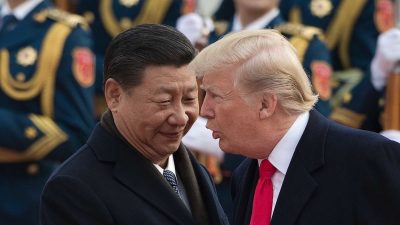US Policy Toward China Wrecking Bilateral Relations

Both right wings of the US one-party state are of a single mind in wanting China’s economic, industrial, technological, and military advancement undermined.
Obama’s near-decade ago prioritization of asserting Washington’s Asia/Pacific presence was and remains key Dem and GOP policy.
Cold War politics never went away. It aims to marginalize, contain, isolate, and weaken key rivals China and Russia — as well as other nations unwilling to subordinate their sovereign rights to US interests.
That’s what Washington’s imperial project is all about, seeking dominance over all other nations, their resources and populations — wanting challengers to its preeminence neutralized or eliminated.
War by hot and other means is longstanding US policy. Challenging China and Russia this way could lead to WW III no one wants but could happen by accident or design, a frightening possibility.
Time and again, Sino/Russian good faith outreach to the US is rebuffed because it clashes with its aim of dominating other nations over mutual cooperation.
China’s Foreign Minister Wang Yi tried again. On Thursday, he called for reconciling bilateral differences to avoid rupturing relations.
Beijing is not seeking to displace or undermine US superpower status, he said, suggesting ways to resolve differences.
“What is alarming is that the Sino-US relationship is one of the most important bilateral relations in the world, but is facing the most serious challenges since the establishment of diplomatic relations” over 40 years ago, he stressed, adding:
“China’s policies towards the US have not changed, and we still want to develop China-US relations in a sincere manner.”
Beijing will resume suspended talks “as long as the (Trump regime) is willing.”
“Only through exchanges can we stop lies, and only through dialogue can we avoid misjudgment.”
Wang and other Chinese officials know that good faith outreach to the US is virtually never good enough.
Time and again, it pledges to do one thing, then goes another way, why it can never be trusted whether Dems or Republicans run things.
Wang called for Chinese and US think tanks to compile three lists:
1. Major issues for both nations to address.
2. Issues where disputes exist, ones that can be resolved through dialogue.
3. Irreconcilable differences.
The latter category risks a major breach in bilateral relations, where things have been heading because of US unwillingness to compromise enough or at all.
Wang understands the challenges to Sino/US relations.
Yet he stressed that both sides “should properly manage…disputes and minimize the damage to (bilateral) relations…based on the spirit of seeking common ground while (respecting) differences.”
Both countries can cooperate on numerous fronts, he said, including on containment of COVID-19 outbreaks with the goal of halting them altogether.
On July 6, Trump continued his anti-China Twitterstorm, falsely accusing Beijing of “caus(ing) great damage to the United States and the rest of the world (sic).”
Clearly it’s the other way around. Time and again, the US blames other countries for its own wrongdoing.
Its relations with China show no signs of easing, a topic I continue to revisit and explain what’s going on, a worrisome situation.
Wang knows that things have deteriorated too much to restore normal bilateral relations.
Yet he stressed that both sides should avoid “decoupl(ing).”
If mutual cooperation between both countries remains unattainable on major issues, chances are relations will deteriorate further.
They’re highly unlikely to improve if Biden succeeds Trump in January.
The US is going all-out to prevent China from becoming the world’s major economy.
Trump’s trade war is all about wanting China’s development countered and undermined.
It’s a prescription for preventing resolution of bilateral differences.
US rage for global dominance made them irreconcilable with China, Russia, Iran, and other sovereign independent countries it doesn’t control.
That’s the stuff major wars are made of, a US specialty, notably throughout the post-WW II period.
*
Note to readers: please click the share buttons below. Forward this article to your email lists. Crosspost on your blog site, internet forums. etc.
Award-winning author Stephen Lendman lives in Chicago. He can be reached at [email protected]. He is a Research Associate of the Centre for Research on Globalization (CRG)
His new book as editor and contributor is titled “Flashpoint in Ukraine: US Drive for Hegemony Risks WW III.”
http://www.claritypress.com/LendmanIII.html
Visit his blog site at sjlendman.blogspot.com.
Featured image: Chinese President Xi Jinping and US President Donald Trump in a file image. Image: Youtube

